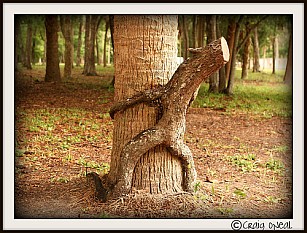public lands
-
Reflecting on a century of economic progress and environmental problems
As the first decade of the 21st century comes to a close, the problem of the commons is more important to our lives — and more central to economics — than a century ago when the first issue of the American Economic Review appeared, with an examination by Professor Katharine Coman of Wellesley College of […]
-
Obama admin delays decision on development in national forests
The Obama administration announced on Thursday that it is delaying a decision on policy that guides the construction of new roads and other development in areas of national forests for one year. An interim directive will guide land use in roadless areas in the meantime. Delayed gratification for roadless advocates. The new directive, issued by […]
-
Art and environment panel discusses price of public art
 Photo: talldrinkawater3000
Photo: talldrinkawater3000I was staring out the window at the Olympic Sculpture Park's beautiful landscape when, about 30 minutes into a panel discussion about art and the environment, moderator Lucia Athens finally mentioned the elephant in the room -- or rather, the sacred cow.
It came in the form of a question thrown out to the panelists -- architect Tom Kundig, style expert Rebecca Luke, and artist Roy McMakin -- about a new bill that would cut the money funneled to public art projects (about one-half of one percent of state building funds). Proposed by Washington Sen. Steve Hobbs (D-Lake Stevens), who has said he considers public art to be a "sacred cow that should be put out to pasture," the bill would save the state $5 million in the next budget.
"Absurd" was Kundig's response. Stand back and look at the proportion, he advised; this bill doesn't look at the big picture of how much money is put toward other, more wasteful projects.
It's not just about the money, McMakin said. Public art is about culture, and it's about jobs. "Art is woven into the culture of the built environment around us."
Why should you care about this public art battle?
-
Utah ORV trail system a poor model
The Paiute ATV Trail, in central Utah's Fishlake National Forest, and adjacent BLM land comprise a network of roads and "motorized trails" that have been linked and promoted for off-road vehicle recreation by public lands agencies. The routes range from custom-designed ATV-only tracks to paved roads through small towns. The majority of the trail uses ordinary dirt roads on federal public lands, sharing them with general traffic.
Its supporters promote it as a win-win model for public lands throughout the nation, bringing in tourism dollars and resulting in less damage to the landscape overall: Theory has it that when you build and sign roads for off-road use, there's no need to go off-road.
Only not. As this story in Wildlands CPR's journal The Road RIPorter states, it doesn't lead to less damage, only more: the Fishlake has a higher density of "user created" routes than do many other forests without a designated ATV-trail system. And the economic benefit to the local area is overblown: The study on its fiscal impact does not stand up to scrutiny.
My advice to these guys: Take a hike.
-
Lands bill clears first Senate hurdle
The Senate approved a motion to move forward with the omnibus lands bill on Sunday, a bill that would protect more than 2 million acres of wilderness in nine states.
The bill combines more than 150 separate pieces of legislation on wilderness areas and other federal lands, and was put together last Congress. It has been repeatedly held up by procedural stalling from several Republican senators, most notably Oklahoma's Tom Coburn. The cloture motion, which passed 66-12, allows the Senate to proceed to debate.
Coburn was nonplussed. "I'm disappointed the Senate majority leader has refused to allow senators the opportunity to improve, amend or eliminate any of the questionable provisions in his omnibus lands bill," said Coburn in a statement.
The Democratic leader, Harry Reid (Nev.), has said he would like this and another pieces of legislation passed before the Martin Luther King Jr. holiday and the inauguration next week. "I'm gratified by the impressive bipartisan support my colleagues showed today in voting to advance this bill," said bill sponsor Jeff Bingaman (D-N.M.) in a statement on Sunday. "I look forward to proceeding to the legislation next week."
Wilderness advocates were pleased as well. "By voting to protect mountains and pristine wildlands, Congress is starting out on the right foot," said Environment America Preservation Advocate Christy Goldfuss. "This Congress is serious about protecting the environment and the outstanding lands that Americans treasure."
-
Senate session will kick off with vote on big wilderness and lands bill
Action in the Senate will begin this year with a Sunday vote on an omnibus public-lands bill, Senate Majority Leader Harry Reid (D-Nev.) announced on Wednesday.
The legislation was reintroduced on Wednesday by Jeff Bingaman (D-N.M.), chair of the Energy and Natural Resources Committee. It combines more than 150 bills on wilderness areas and other federal lands, and would protect more than 2 million acres of wilderness in nine states.
Tom Coburn (R-Okla.) repeatedly blocked the bill last year, and has threatened to do so again, using any parliamentary tactic necessary. "The decision by Senate leaders to kick off the new Congress with an earmark-laden omnibus lands bill makes a mockery of voters' hopes for change," said Coburn in a statement on Tuesday. "This package represents some of the worst aspects of congressional incompetence and parochialism. Congress should spend the next few weeks holding hearings on an economic stimulus package and identifying areas of the budget to cut to pay for that proposal. Instead, the Senate is set to resume business as usual."
-
Tim DeChristopher and Utah stand up to Big Oil
I've never been big on rules.
Neither, apparently, is Tim DeChristopher. He's the young activist who just completely derailed the Bush administration's plans to sell more of our public lands to the oil companies.
He sat in the lease sale in Salt Lake City on Dec. 19 and "bought" 22,500 acres of public lands right out from under the suits from Chevron and Exxon.
One small problem -- Tim doesn't actually have the money. It almost doesn't matter, though, because he's monkeywrenched the process so thoroughly that they won't be able to conduct another sale until after the Obama administration takes over -- and thus hopefully never.
Tim needs to raise $45,000 by this Friday, Jan. 9, in order to avoid fraud charges and put the sale out of reach to the Bush administration and their oily friends. He's already raised almost half.
I, for one, will be supporting Tim DeChristoper, Bidder 70, with a tax-deductible contribution via the Center for Water Advocacy in Moab, Utah.
He deserves thanks for reminding all of us that direct action still gets the goods!
-
Solar’s bright ideas for the green stimulus package
Carrying on one of the most annoying campaign memes (and boy is that bar high) into current policy discussions, the New York Times published an article that begins with the line: Move over Joe the Plumber. Spencer the Solar Installer is here. Every group under the sun has ideas for how their issue could be […]
-
Placing coal reserves into trust status would be a nice gift to our kids’ future
A generation before David Brower started raising hell at the Sierra Club, a similarly militant scientist named Victor Ernest Shelford organized the Ecological Society of America, becoming its first president in 1916. Shelford stepped down from that position when the Ecological Society of America shied away from taking controversial stands. With a small group of […]

